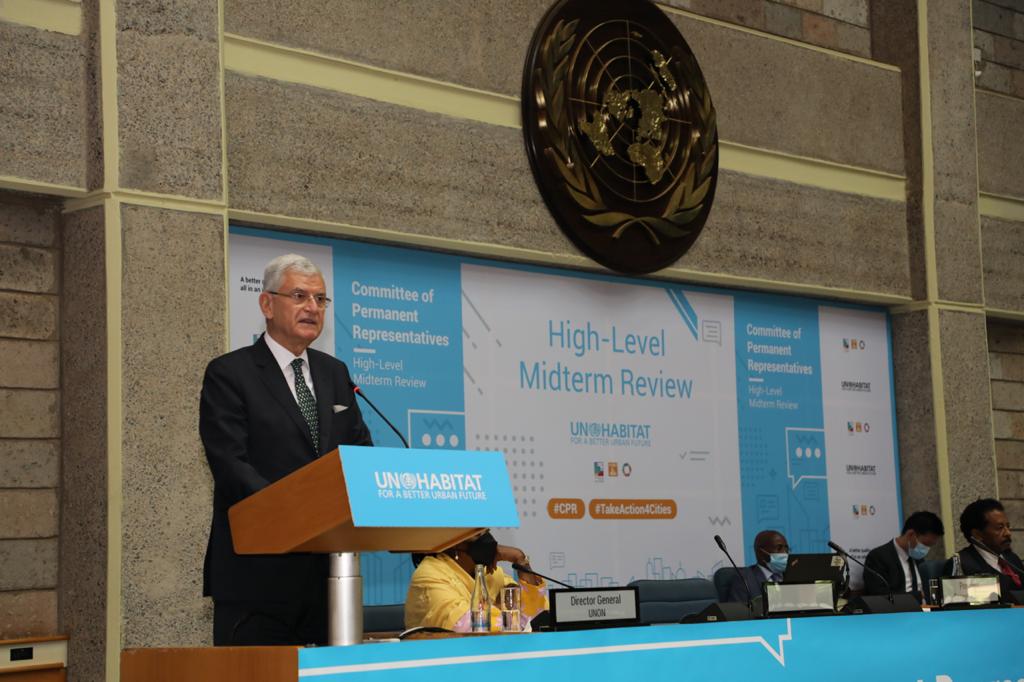Nairobi, 29 June 2021—The Committee of Permanent Representatives to UN-Habitat (CPR) opened its first high level mid term review meeting with discussions on the impact COVID-19 has had on cities and towns and their role in the recovery.
The Committee of Permanent Representatives of UN-Habitat (CPR) convenes every two years, in an open-ended manner. The CPR is reviewing the achievements made by UN-Habitat in the implementation of the Strategic Plan (2020 – 2023) currently at the midpoint. It is an opportunity for Member States to provide their views, guidance and advisory to help UN-Habitat promote transformative change in cities and human settlements.
The meeting, which runs to 1 July, is a hybrid format with delegations-based outside Kenya participating virtually and Member States based in Nairobi meeting at the UN compound in Gigiri.
In his speech read by the Cabinet Secretary for Lands and Physical Planning Ms. Farida Karoney, Kenya’s President Uhuru Kenyatta said: “The Global COVID-19 pandemic has presented new socio-economic dimensions in the management of cities which have been the epicentres of COVID-19. This has caused disruptions in economic and social dimensions, to the urban poor, calling for a complete paradigm shift in approaches to urban governance.
He referred to the high level dialogue on “Cities and Pandemics” being held on Wednesday as an important step in giving Member States an opportunity to share experiences, insights and exchange best practices on the pandemic and its implications on the resilience of cities.

“I am confident that the dialogue, will come up with pragmatic solutions on how to improve existing programmes, projects and policies in addressing future health crisis and resilience of cities in the emerging post-pandemic scenario,” said President Kenyatta.
In his address, the President of the United Nations General Assembly Mr. Volkan Bozkir, who is on his first official visit to Kenya, said that COVID-19 had demonstrated the connection between the urban and natural world as well as between the health of the planet and people’s health.
“Governments and cities are struggling to raise the funds needed to implement green COVID-19 recoveries. One of many of the UN Habitat’s Strategic Plan objectives is to increase and equitably distribute land-based revenues. I urge Member States to urgently fund the Strategic Plan, and support countries green recoveries from the pandemic,” said President Kenyatta.
UN-Habitat Executive Director Maimunah Mohd Sharif said that UN-Habitat, as the lead UN agency in charge of urbanization and cities, had done much work around combating COVID-19 effects.
“We have shown, and global evidence points clearly, that it is unsustainable urbanisation which has magnified the effects of the pandemic. Density is not an inherent risk factor, but inequality, overcrowding, poor access to basic services, and poverty have been directly correlated with higher risk of transmission, illness, and death. We know that even before the pandemic, 75 per cent of cities were becoming more unequal. The pandemic has thrown a bright light on what we have known, and deepened this divide even further,” she said
Zainab Hawa, Bangura Director-General of the United Nations Office at Nairobi (UNON) said the meeting highlighted the importance of UN-Habitat’s mandate at a time when cities were at the frontline of the fight against COVID-19.
“In a very short time, COVID-19 has fundamentally transformed the way we work, the way we live, and interact,” said Zainab Hawa, Bangura Director-General of the United Nations Office at Nairobi (UNON)